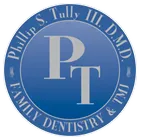What is TMJ?
Temporomandibular joint "TMJ" syndrome, also known as TMD, is a disorder of the temporamandibular joint and the jaw muscles. This hinge is formed by the temporal bone of the skull and the lower jaw, or mandible.
 TMJ is often called the "Great Imposter", because it is overlooked as a cause of problems or mistaken for some other disease. The causes of TMJ are complex. The TMJ tendency may be inherited or the result of childhood injuries. The
symptoms can lie dormant for some time and then suddenly appear for no apparent reason. Because of the diversity of symptoms and contributing factors, many people seek help for years before receiving an accurate diagnosis.
TMJ is often called the "Great Imposter", because it is overlooked as a cause of problems or mistaken for some other disease. The causes of TMJ are complex. The TMJ tendency may be inherited or the result of childhood injuries. The
symptoms can lie dormant for some time and then suddenly appear for no apparent reason. Because of the diversity of symptoms and contributing factors, many people seek help for years before receiving an accurate diagnosis.
The temporomandibular joint is unique in that it is made up of two separate joints that work together to control the movements of the jaw. Changes in a patients bite can cause the movements of the jaw to pop or grind when opening. When the disc does not move correctly with the jaw it can cause pain. Several things may cause this change to occur including; missing teeth, dental work, injury of trauma to jaw, grinding and clenching.
Since our TMJ patients are fitted with Gelb appliances, many, with prior orthodontic treatment, ask if their TMJ appliance can be worn in conjunction with their orthodontic retainers. The answer is yes! The two mouth pieces accomplish two very different functions. Orthodontic retainers are made to “retain” teeth in a certain position while TMJ appliances are designed to reposition the jaw joint in a certain position. For the convenience of our TMJ patients we are able to design the appliance to fit comfortably over the orthodontic retainer.
Symptoms of TMJ
Head Pain or Headaches:
- Temple pain or headaches
- Shooting pain up back of head
- Hair and/or scalp painful to touch
Ear problems:
- Hissing, buzzing or ringing in ear
- Ear pain or ear ache with no infection
- Clogging "itchy" ears
Jaw problems:
- Clicking, popping jaw joints
- Grinding sounds at jaw
- Pain in facial muscles
Teeth:
- Clenching or grinding at night or through the day
- Looseness and soreness of back teeth
Eyes:
- Pain behind eye
Neck problems:
- Lack of mobility, stiffness
- Neck Pain
- Tired, sore muscles
- Shoulder aches
Mouth:
- Discomfort
- Limited opening of mouth
- Inability to open smoothly
- Jaw deviates to one side when opening
- Bite has changed; teeth don't meet together
We have found that many patients with TMJ disorders do not sleep properly and this can cause added stress to the jaw. There are many stages of sleep, the deepest stage is the one that relaxes the muscles and allows them a chance to rest. We find that most patients do not reach that stage and therefore are not properly rested. They awake with their muscles feeling tight and tender.
If one suffers from two or more of these common symptoms, TMJ may be the problem. The first step toward a diagnosis is to schedule an appointment with your family physician to rule out other medical conditions.
If you are experiencing some of the symptoms of TMJ, call our Columbus, GA dental office at (706) 323-6491.

